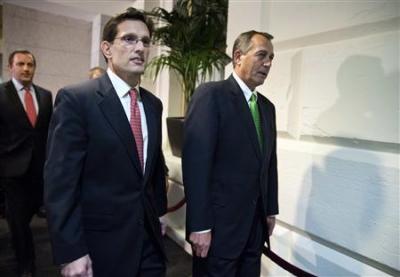Is Congress Asking Hourly-Paid Americans to Work More for Less Pay?

Democrats, Labor Unions and Republican legislators are now at loggerheads over a bill passed in the House of Representatives last Wednesday that seeks to allow private employers to offer hourly-paid workers compensatory time off instead of time-and-a-half pay for overtime.
The bill, Working Families Flexibility Act, passed overwhelmingly with 220 Republican and three Democratic votes.
"This is about helping working moms and dads, providing the ability to commit time at home," said Rep. Martha Roby (R-Ala.), who sponsored the bill as an update to federal labor law in one report. "This is something that the public sector has engaged in for many many years. If it's good enough for the federal government, it ought to be good enough for the private sector."
The Fair Labor Standards Act currently dictates that hourly-paid workers be paid time-and-a-half for every hour worked in excess of 40 in a week. The statute was designed to reward workers for their extra hours and keep employers from overworking their workers.
Democrats who aggressively debated the bill in the House last week have labeled it the "More Work, Less Pay Act." They have predicted it won't get beyond the Democrat controlled Senate and even if it does, the White House has vowed to veto the legislation.
In a New York Times editorial last Friday, the publication noted that while the new proposal for comp time is supposed to be worked out between workers and employers in theory, the arrangement is likely to be influenced by other forces in practice.
"Employers and workers are supposed to agree on the arrangement, but there is nothing to stop an employer from discriminating against those who prefer payment by cutting back on their overtime hours," noted the Times.
"Nor would employers face any real deterrent against forcing unpaid overtime on workers who fear losing their jobs if they object. The recourse for coerced workers would be to sue, a far-fetched and unaffordable option for most people. For employers, then, the bill is a way to impose extra work at no additional cost, effectively shifting what would otherwise be worker pay into corporate profits," it added.
The Times also rebutted arguments that since comp time is being used by the federal government, private companies should also be allowed that option as well.
"Government employers don't need to turn a profit, and thus do not have the same incentive as private sector employers to push workers into unpaid overtime. Government employees, who tend to be in unions — as well as private sector unionized workers — also have contracts with safeguards around alternative work and pay arrangements," noted the Times.
In a recent op-ed published in The Huffington Post, Rep. Gwen Moore and Arlene Holt Baker noted that the proposed amendment to the current labor laws does nothing for the millions of hourly-paid workers in America.
"At least 63 million private sector workers are required to be paid time-and-a-half for hours worked beyond the 40-hour workweek. Under H.R. 1406, workers who work overtime would never see a bump in their paycheck and would earn less take-home pay," they argued.
"The 'choice' to take time off sounds nice, but as many working parents and people of color know too well, calling something a 'choice' assumes there are viable options. For many working families, taking home less pay at the end of the day means less money to cover rent, education costs, medical bills and other living expenses. The 'choice' to take unpaid time off is not a choice at all," they added.





























